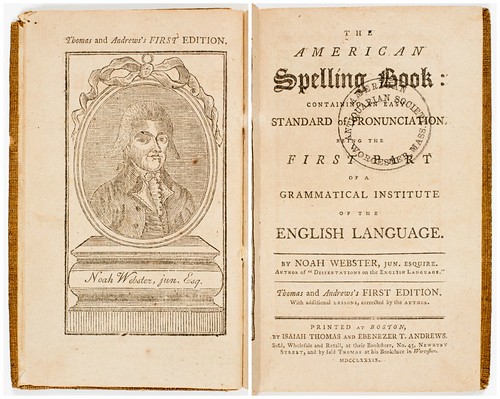
PREV ARTICLE
NEXT ARTICLE
FULL ISSUE
PREV FULL ISSUE
NOAH WEBSTER’S AMERICAN ENGLISH
We love words at The E-Sylum. Here's a non-numismatic article, but one that helps explain why American and British English spellings are so different. It's primarily the work of one man, Noah Webster. Be sure to read the full version of the American Antiquarian Society's Past is Present blog entry online.
-Editor

Noah Webster was born on October 16, 1758 to a well-respected West Hartford, Connecticut family. He and his siblings received a great deal of attention from his parents in the form of instruction on religion, morality, and academic subjects. In The Forgotten Founding Father (2010), Joshua Kendall argues that Webster gleaned from his upbringing an admiration for his authoritarian parents as well as a view of himself dependent on his accomplishments (15). He engaged in private studies with a local pastor before entering Yale College in the 1770s, where he developed revolutionary sympathies as he lived through events like the Battles of Lexington and Concord, after which he showed his patriotism by joining his classmates in a student-directed military drill. After graduating from college in 1778, Webster turned to the law profession. He soon redirected his career to teaching for a more stable income, and founded a successful school in Sharon, Connecticut in 1781. Webster went back and forth between teaching assignments for a number of years. He then turned his attention to what would be a best-selling project, uniting his ambitions for nationalism, “fame and silver dollars” (Kendall, 71).
OK, so THERE'S a numismatic reference - "silver dollars"!
-Editor
In these post-Revolutionary years, Webster voiced strong convictions that a national language would unify the independent and distinct states. He published his American Spelling Book in 1783 as the first of a three-part series on the English language. Webster wrote in his preface that he wished to “diffuse uniformity and purity of language in America [and] destroy provincial prejudices” which he believed had arisen as a result of unstandardized spellings and varied pronunciations of words. Webster borrowed heavily from Thomas Dilworth’s A New Guide to the English Tongue, printed in England in the mid-eighteenth century. Webster added key modifications, however, including the fact that the language of his speller was more readable (Kendall, 72). Furthermore, he employed standardized syllables that reflected pronunciation, as opposed to Dilworth’s syllables based on Latin grammatical rules (Kendall, 74). Webster also included moral lessons instead of heavy Christian concepts. His Spelling Book took off, selling a million and a half copies between 1783 and 1801. This number is significant considering that the U.S. population was only about 2.8 million people in 1780 (Lemon, 122). AAS holds multiple editions of the Spelling Book, including a 1789 edition and a corresponding digital copy.
The Forgotten Founding Father is a book I've been meaning to read. There's always my birthday and Christmas...
-Editor
To read the complete article, see:
Noah Webster’s American English
(pastispresent.org/2014/good-sources/noah-websters-american-english/)
The Numismatic Bibliomania Society is a non-profit organization promoting numismatic literature. See our web site at coinbooks.org. To submit items for publication in The E-Sylum, write to the Editor at this address: whomren@gmail.com To subscribe go to: https://my.binhost.com/lists/listinfo/esylum All Rights Reserved. NBS Home Page Contact the NBS webmaster 
|